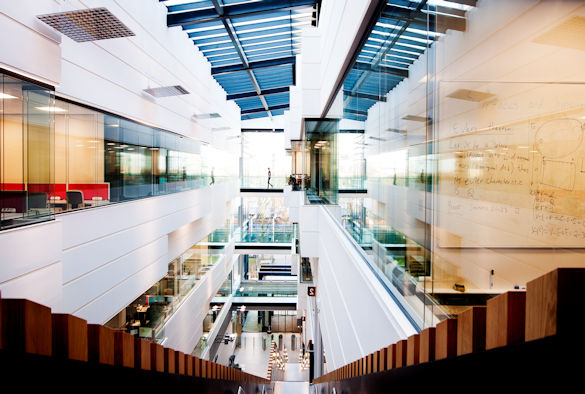The University of Liverpool, the University of Southampton and the University of Rostock, Germany, have been awarded a prestigious ERC research grant to combine computational chemistry and robots to discover new materials.
It is the first time the University of Liverpool has won a Synergy grant from the European Research Council. These grants are awarded to research that has “the potential of becoming a benchmark on a global scale”.
Graeme Day, Professor of Chemical Modelling at the University of Southampton, is leading the project, working alongside Professor Andy Cooper FRS from the University of Liverpool’s Department of Chemistry, and Professor Kerstin Thurow from the University of Rostock in Germany.
Called ADAM (Autonomous Discovery of Advanced Materials), the six-year project will combine computational modelling, artificial intelligence and machine learning in a Computational Engine to guide robots working in a materials chemistry lab. The aim is to build an autonomous platform that can discover new materials by efficiently exploring the huge number of possible permutations that could be synthesised.
Professor Day explained: “There is a need for new materials in all aspects of our lives, be it healthcare, or for energy generation and storage, or for data storage, or pollution control. We use materials all over the place, and we often need materials with a specific property or combination of properties – that is the issue we are addressing.”
Currently, new materials are often discovered through trial and error, because the empirical rules used to predict how molecules arrange themselves in a solid are incomplete. This project will greatly accelerate this process, saving both time and money. It also has the potential to discover important new materials that we otherwise would not have conceived. This project builds on a collaboration between Professors Day and Cooper that has already led to two joint papers in the journal Nature.
The computational modelling expertise will come from Southampton, while the University of Liverpool has expertise in both the discovery of new materials and robotics. The University of Rostock is a leader in robotics and laboratory automation.
Professor Cooper said: “The big scientific problems of the future are going to be solved by teams, and I’m thrilled that I will get the opportunity to work with Graeme and Kerstin on this. It has never been more important than now to build strong links to our partners and collaborators in other countries.”
Professor Wiebe Van Der Hoek, Executive Pro Vice-Chancellor for the University’s Faculty of Science and Engineering, added: “This is a major achievement for Professor Cooper and for the University. ERC Synergy grants are extremely coveted and this award is important recognition of the standing of Professor Cooper and his pioneering collaborative work bringing together computational chemistry and robots to discover new materials.”
The Liverpool part of the project will be based in the Materials Innovation Factory, an £81 million project dedicated to the research and development of advanced materials. The facility, established in collaboration with Unilever, brings together materials chemistry expertise with the latest computational and robotic equipment to accelerate research and reduce the development time for new products to address societal needs.
